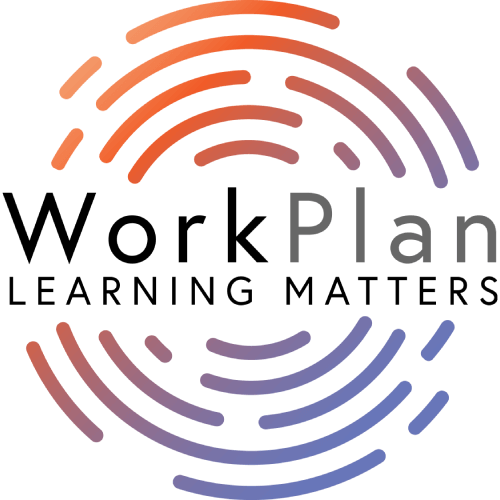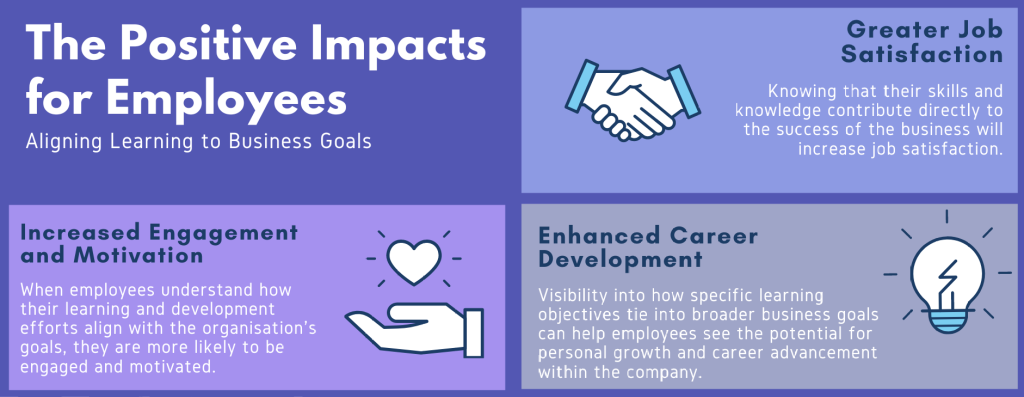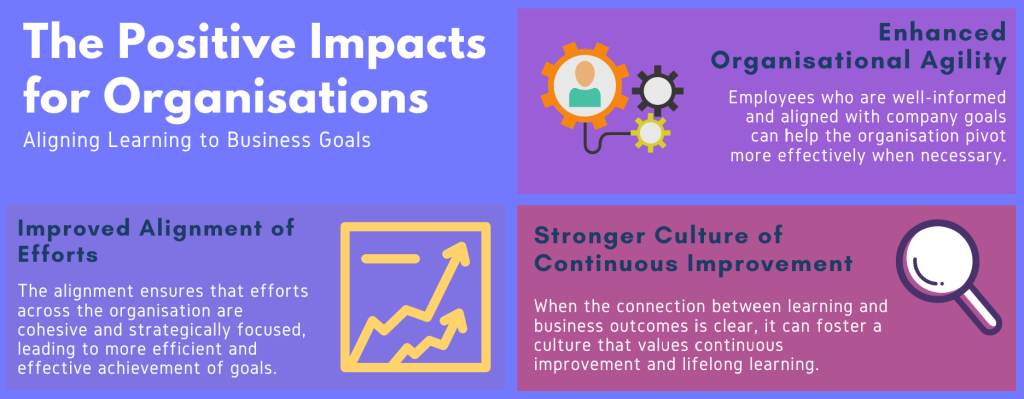Aligning learning to business goals is L&D’s top focus area for the second year in a row in 2024
According to the LinkedIn Workplace Learning Report 2024, aligning learning to business goes continues to be a top priority. Leveraging a Learning Management System that makes those direct connections between learning and business goals will:
- expedite that process of learning and business goal alignment more efficiently and effectively.
- provide more positive benefits for your organisation and your employees.
Business Goals through the filter of team objectives
Business goals provide direction and focus to make informed decisions and ensure ongoing growth and success. Without business goals, most businesses and organisations will eventually fail.
Business goals are typically developed through a strategic planning process and are influenced by numerous stakeholders within an organisation, such as the executive team, board of directors, managers, shareholders and employees.
The first step in aligning learning to business goals is for the goals to be visible throughout the organisation.
Better still is for L&D professionals to be a part of the process of defining the business goals. Business goals belong to the entire organisation.
Some common strategic business goals may include:
In order for businesses to achieve their goals, employees need to have clear visibility of the business goals and know what they need to do to achieve them. Reaching your business goals is a team effort and team objectives play a critical role in translating broader business goals into specific, actionable, and measurable tasks.
The Positive Impacts of Aligning Learning to Business Goals
There are many positive impacts for employees and organisations when learning is aligned to business goals.
Here are three positive impacts for employees when they can see the direct link of their learning activities to business goals within an LMS:
- Increased Engagement and Motivation
- When employees understand how their learning and development efforts align with the organisation’s goals, they are more likely to be engaged and motivated. This understanding fosters a sense of purpose and can make learning activities feel more relevant and rewarding.
- Greater Job Satisfaction:
- Knowing that their skills and knowledge contribute directly to the success of the business will increase job satisfaction. Employees who see a clear link between their learning and the organisation’s achievements are more likely to feel valued and part of the team.
- Enhanced Career Development
- Visibility into how specific learning objectives tie into broader business goals can help employees see the potential for personal growth and career advancement within the company. This can lead to increased investment in their own development and enthusiasm for taking on new challenges.
Here are three positive impacts for organisations when there is a direct link between learning and business goals:
- Improved Alignment of Efforts
- When employees understand the business goals, they can better align their learning and daily activities towards these objectives. This alignment ensures that efforts across the organisation are cohesive and strategically focused, leading to more efficient and effective achievement of goals.
- Enhanced Organisational Agility
- With a workforce that understands and is trained in key areas aligned with business objectives, organisations can adapt more quickly to changes in the market or industry. Employees who are well-informed and aligned with company goals can help the organisation pivot more effectively when necessary.
- Stronger Culture of Continuous Improvement
- When the connection between learning and business outcomes is clear, it can foster a culture that values continuous improvement and lifelong learning. This can lead to ongoing enhancements in processes, products, and services, driven by a workforce that is continually developing relevant skills and knowledge.
In order to achieve these positive impacts, organisations need to ensure that all employees are informed and understand the organisation’s business goals and their specific team objectives and how it relates to learning they undertake. This visibility of the connections between business goals, team objectives and learning provides clarity and enhances alignment, increases engagement, and drives better results across the organisation.
That is where the right LMS will leverage these benefits of aligning learning to business goals:
- an LMS that shows the direct links from business goals to team objectives and from the team to the required learning or knowledge-sharing activities
- an LMS that enable team managers or subject matter experts to create and deliver the learning and coaching
How WorkPlan can help
Here are just a few of the ways WorkPlan Learning can help organisations align learning business goals and team objectives as an LMS:
- Be the repository for business goals, team objectives, teams and learning/knowledge sharing – visible to all employees
- Deliver learning and knowledge sharing aligned to business goals
- Provide real-time analytics and reporting of the alignment of learning to business goals
- Facilitate team collaboration and coaching spaces to empower team managers and subject matter experts
If you need to refine your business goals, our WorkPlan Strategic Planning Program will give you an easy-to-understand executable strategy.
By aligning learning to business goals directly within an LMS, organisations can enhance employee engagement and productivity that will lead to an overall organisational success.
Take the first step towards empowering your workforce. Start integrating your business goals to unlock the full potential of your organisation with WorkPlan Learning. Contact our team for a personalised consultation to transform your learning strategy and align it with your business objectives.
ALSO READ: How You Can Implement Your Strategy Through WorkPlan Learning
Align your learning to business goals quickly with WorkPlan Learning
WorkPlan Learning is simple to use and delivers an easy way to align learning with your strategic goals and team objectives. You will also have access to meaningful analytics to ensure higher levels of engagement in your business.
Talk to our team today about accessing a demo
Related Articles
Are you ready to take your business to another level?
Contact us today
Head Office
1300 726 708
+61 7 3220 2229
Melbourne Office
+61 3 9752 5651
In the spirit of reconciliation WorkPlan acknowledges the Traditional Custodians of country throughout Australia and their connections to land, sea and community. We pay our respect to their Elders past and present and extend that respect to all Aboriginal and Torres Strait Islander peoples.








